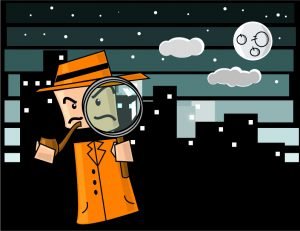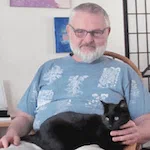I was standing in the stacks of the Sutro Library in San Francisco, following a lead on a case I was working. I was not a private detective, but I had aspirations to be one, and my sister-in-law wanted me to find a college classmate whom she had lost touch with, I guess, the minute they had graduated. And she was willing to pay me to find her friend. I offered to do it for free, but she knew that her sister and I were not doing that well, and, besides, my sister-in-law was a successful lawyer.
She had provided me with what she knew about the man she wanted to find. She had tried finding him herself without success. I did not know that I could do it for sure. I had his name and the fact that his father was in the U.S. Navy, although I had a few other details that turned out to be helpful. It was the late 1980s, and my sister-in-law and her long-lost friend were early boomers. They were approaching middle-age, and she wanted to reconnect with him. Maybe share the kind of war stories that ’60s radicals share.
I had no idea where in the United States (or overseas for that matter) to look for the old classmate, whom I will call Tom Phipps. Tom’s dad, however, was liable to be retired, and I knew that the family had lived in San Diego and liked it, so I started looking for Tom’s father there. The Boston private eye, Gil Lewis, was kind of a mentor to me, though not that he ever knew it, but I had read journalist John Sedgwick’s newspaper articles and book (Night Vision, 1982) about Lewis, and I had picked up a few tips from Lewis. One of the best was, “If you can’t find the person you’re looking for, find someone who is close to them.” (Lewis once tracked down the elusive Howard Hughes by keeping an eye on the only people he apparently trusted, his Mormon companions.)

Tom’s dad seemed likely to be easier to find than Tom himself. Sure enough, I found his address in San Diego. There he was in a city directory, but not in the phone book. He had been at that same address for a few years. He lived with his wife, but there was no one else listed in the household. The phone number was unlisted. What to do? Write him a letter? Too slow. (This was well before I or anybody that I knew had email.)
I applied Lewis’ rule again. “If you can’t find the person you’re looking for, find someone who is close to them.” Listed on either side of their street address, Tom’s parents had neighbors. One neighbor was a retired woman who had not been living on the street for very long. On the other side, there was couple who had been there for years and seemed to be about the same age as Tom’s parents. Their phone number was listed.
I went into the lobby of the library where they had a bank of pay phones. (I won’t explain those to the younger generation, but these were what people had to use before there were cell phones, which just barely existed in 1987 and were over-sized and expensive.) There was an alert, gray-haired woman in her mid-sixties sitting on a bench in the lobby, but I paid little attention to her. I grabbed a phone and called the number I had just gotten for the neighbors of Tom’s parents. We’ll say their name was Caine. Mr. Caine answered. I told him who I was and that I was trying to get in touch with his neighbor, Lloyd Phipps. Being of sound mind, Mr. Caine was suspicious and had a lot of questions. I answered them as honestly as I could.
“You’re lying,” Caine said in his most triumphant gotcha! voice. “The Phippses don’t have a son.”
This was news to me, and I had no comeback. I figured this line of inquiry was doomed.
“Hold on,” said Mr. Caine. “What? Oh. My wife says they do have a son.”
Not long afterward, Mr. Caine gave me his neighbors’ phone number.
I have often mused about how it could be that Mrs. Caine knew that the Phippses had a son, but Mr. Caine did not. I imagine the couples getting together to share beers, and while Monsieurs Caine and Phipps watched football, their wives went into the kitchen and talked about their families.
When my phone call rang at the Phipps house, Mr. Phipps picked up. I gave him my spiel but he interrupted me. His neighbor had moved quickly to let him know that he had given me their number. So much the better if I didn’t need to explain everything, but I still had to convince him that I wasn’t up to no good. When I explained that my sister-in-law was looking for their son because they had been friends in school, he wondered out loud why, if they were such good friends, they had not remained in touch. I didn’t really know why not, and I told him so, but, apparently, his son had never mentioned my sister-in-law.
“Does she know that he’s married?” said Mr. Phipps.
This was an issue that my sister-in-law had anticipated, so I assured him that my sister-in-law was married herself—leaving out the fact that her marriage was on the rocks at the time—and that she just wanted to renew a platonic friendship. “I don’t know where your son lives, but my sister-in-law lives in Texas, so I believe that she is anticipating a long-distance sort of get-reacquainted.”
Finally convinced, Mr. Phipps got his wife to hand him Tom’s address and phone number, and he read them both to me. I was not expecting this good luck. I had been prepared to give Mr. Phipps my sister-in-law’s contact information for him to pass on to his son. I already had my pen and notebook ready, though, and I took down the information. After thanking him, I hung up and turned to go. The gray-haired lady I had forgotten about approached me. I looked at her more carefully. At the time, I was in my thirties and generally not attracted to women over sixty, but I noticed that she was pleasant-looking, neatly coiffed and well-dressed in a light blue suit. (Getting ahead of the story, I have since seen a photo of her from when she was in her twenties, and she was a hottie.)
“My name is Mary Limebrook,” she said. “I couldn’t help overhearing. Are you a private investigator?”
“No,” I admitted, “I’m an amateur.”
“Well, you seemed very professional,” she said. “I work for a private investigator. We’re located in southern California, and I come up here sometimes to do research. Do you live in the Bay Area?”
“I live across the Bay in Berkeley,” I said.
“I’ve been thinking that it doesn’t make sense for me to come up here so often. I thought if we had someone who already lived here to help us out, it would be ideal. Would you be interested?”
I said that I would. She explained that she would have to bring it up with her boss, but she promised to do so, and then she gave me a slip of paper from her notebook, which I still have. It gave me her name and phone number, the name of the agency and the name of the owner.
No, this is not the story of how I became a P.I. It turned out that her boss was less interested in saving Mrs. Limebrook’s airfare to San Francisco than she was. I talked to him on the phone a couple of times before I got the distinct impression that he was avoiding me and any commitment. He did send me some brochures—or maybe that was Mrs. Limebrook’s idea. Anyway, after a while, I gave up on Worldwide Tracers and went on with my life, over time doing less and less straight-up people-finding, although I did become my family’s resident genealogist.
Recently, I found that piece of paper that Mary Limebrook gave me that day in 1987(?), and I looked her up on the internet. Not surprisingly, she is no longer with us, which is the reason I feel no reluctance to use her real name. I don’t know about Pat Rutherford, but at least he seems to have long since turned over the day-to-day of Worldwide Tracers to his son. The firm was primarily if not exclusively concerned with finding people who have been separated by adoption, something I know about, having been adopted myself. That is how I got into genealogy and people-finding. Mrs. Limebrook turns out to have been an accomplished genealogist herself.
I passed along the information to my sister-in-law, and she sent me a check for a couple of hundred dollars. I later learned that she immediately called her old classmate, and they had a happy reunion, at least over the phone. BTW I never did meet my now ex-sister-in-law face-to-face. She was only ever a voice on the phone, calling California from Texas.

Share this post with your friends.

